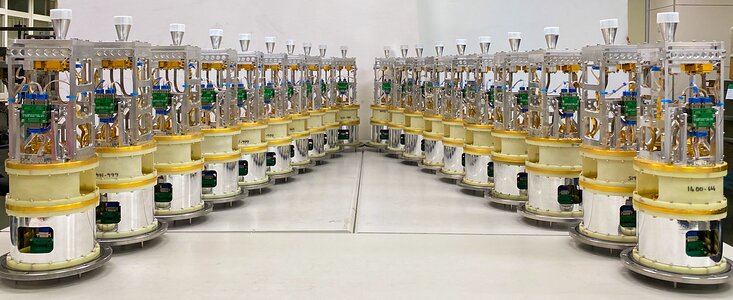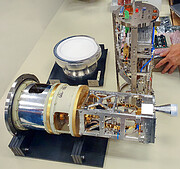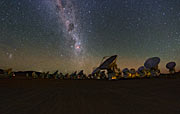Tiedote
ALMA siirtyy kohti uusia aallonpituuksia
Uudet vastaanottimet mahdollistavat ALMA:n tekemät uudet varhaisen universumin tutkimukset pisimmillä toistaiseksi käytetyillä aallonpituuksilla
8. syyskuuta 2021
Atacama Large millimetre/submillimetre Array eli ALMA havaintolaitteeseen asennetut uudet vastaanottimet ovat aloittaneet toimintansa. ESO on on ALMA:n yhteistyökumppani. Band 1 vastaanottimet keräävät radioaaltoja 6-8,5 mm aallonpituuksilla, joka on ALMA:n havaintoaallonpituuksien uusi ennätys. Uuden vastaanottimen avulla tähtitieteilijät voivat tarkkailla varhaista, kaukaista maailmankaikkeutta ja tutkia, miten planeetat muodostuivat paremmin kuin koskaan aikaisemmin.
Jotta kaukaisista kosmisista kohteista tulevaa säteilyä pystytään vastaanottamaan laajalla aallonpituuskaistalla, niin Chilessä Chajnantorin tasangolla sijaitsevat ALMA:n 66 antennia on varustettu tarkasti viritetyillä vastaanottimilla. Jokainen vastaanotintyyppi on herkkä tietyllä sähkömagneettisen spektrin alueella tai tietyille aallonpituuksille. Vielä vähän aikaa sitten suunnitelluista kymmenestä vastaanottimesta kahdeksan oli antenneihin asennettuna, jotka kattoivat havaintoikkunan 0,3-3,6 mm (kaistat 10-3) alueella.
Band 1 vastaanottimien ansiosta ALMA kykenee tekemään havaintoja vielä pidemmillä valon aallonpituuksilla, joka avaa uuden havaintoikkunan maailmankaikkeuteen. Tutkijat toivovat pystyvänsä tutkimaan maailmankaikkeuden uudelleenionisaatioaikana esiintynyttä kaasua eli sitä aikakautta, jolloin ensimmäiset tähdet ja galaksit muodostuivat. Koska se pystyy havaitsemaan suurempia pölyhiukkasia kuin muilla ALMA-kaistoilla, band 1 sopii hyvin tähtien ympärillä olevissa kiekoissa olevien vastaavien hiukkasten kasvun tutkimiseen. Siten tähtitieteilijät pystyvät saamaan paremman käsityksen siitä, miten planeetat muodostuvat.
ALMA:n 'band 1'-vastaanottimien kehitystä on johtanut Taiwanin Academia Sinica Institute of Astronomy and Astrophysics (ASIA), ja mukana on ollut kansainvälinen tiimi, johon kuuluu Japanin kansallinen tähtitieteellinen observatorio (NAOJ), Chilen yliopisto, National Radio Astronomy Observatory (NRAO), Herzbergin astrofysiikan instituutti Kanadassa ja National Chung-Shan Institute of Science and Technology Taiwanissa. Chilen yliopisto on ollut hankkeessa mukana alusta lähtien ja auttanut kehittämään ja tuottamaan optisia komponentteja, kuten linssejä ja antenneja (horn antennas) 'band 1'-vastaanottimiin.
Lisätietoja
ALMA on ESO:n (jäsenmaita edustaen), NSF:n (Yhdysvallat) ja NINS:n (Japani) kumppanuus yhdessä NRC:n (Kanada), MOSTin ja ASIAAn (Taiwan) sekä KASIn (Korean tasavalta) kanssa yhteistyössä Chilen tasavallan kanssa. Yhteistä ALMA-observatoriota hallinnoivat ESO, AUI/NRAO ja NAOJ.
Taiwanissa Academia Sinica ja Taiwanin tiede- ja teknologiaministeriön avustukset ovat tukenee 'band 1'-tutkimushanketta.
ALMA:n hallitus allekirjoitti hiljattain sopimuksen band 2 vastaanotinten kehittämisestä, jota Euroopan instituuttien muodostama konsortio johtaa.
Yhteystiedot
Ciska Kemper
European ALMA Programme Scientist
European Southern Observatory
Garching bei München, Saksa
Puh.: +49 89-3200-6447
S-posti: Francisca.Kemper@eso.org
Bárbara Ferreira
ESO Media Manager
Garching bei München, Saksa
Matkapuhelin: +49 151 241 664 00
S-posti: press@eso.org
Tiedotteesta
| Tunnistus: | ann21012 |





